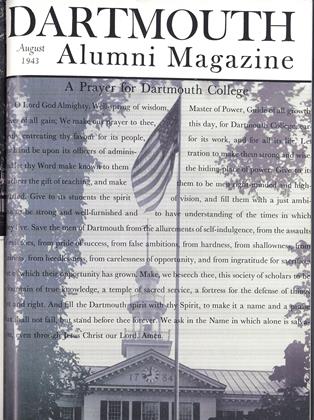ROBERT FROST, foremost American poet, who spent his freshman year at Dartmouth 51 years ago, will return to the College this fall as a member of the faculty. He will hold the title of Ticknor Fellow in the Humanities and will have no formal departmental connection, President Hopkins has disclosed.
Mr. Frost will make his headquarters in the Baker Library, where a seminar room and a faculty study will be made available to him for his extra-curriculum work with Dartmouth men. His appointment and the announcement that he will work within the library give important impetus to plans which recently have been discussed here for making greater use of the library as a teaching focus.
Although definite announcement of Mr. Frost's work at Dartmouth will await his arrival in October, it is expected that during his periods on the campus he will hold regular Friday night seminars and will also work individually with students who seek his counsel and advice. Occasional public lectures are also anticipated.
Mr. Frost will be free for such outside appointments as he wishes to make, but the major portion of his time will be devoted to the newly established Ticknor fellowship, which bears the name of George Ticknor, 1807, exponent of the humanities, whose personal library recently came to the College by bequest.
Mr. Frost, four times winner of the Pulitzer Prize for poetry and author of seven books of poems known throughout the literary world, will come to Dartmouth from Harvard, where since 1939 he has held the Ralph Waldo Emerson Fellow- ship in Poetry and where in 1935-36 he was Charles Eliot Norton Professor of Poetry. He has previously taught at Amherst, Michigan, and Yale, all of which have given him honorary degrees, as has Dartmouth, which awarded him the Doctorate of Letters in 1933.
The winning of four Pulitzer poetry prizes is unprecedented. Mr. Frost won the first of these in 1924, two more in 1930 and 1937, and the most recent was awarded him last year for "A Witness Tree." His first book of poetry was "A Boy's Will," published in 1913.
 View Full Issue
View Full Issue
More From This Issue
-
 Article
ArticleDARTMOUTH WAR DIRECTORY
August 1943 -
 Lettter from the Editor
Lettter from the Editor'Round the Girdled Earth
August 1943 -
 Article
ArticleOpportunity for Improvability
August 1943 -
 Class Notes
Class Notes1934
August 1943 By JOHN W. KNIBBS III -
 Class Notes
Class Notes1918
August 1943 By ERNEST H. EARLEY -
 Class Notes
Class Notes1937
August 1943 By JOHN H. DEVLIN JR.








